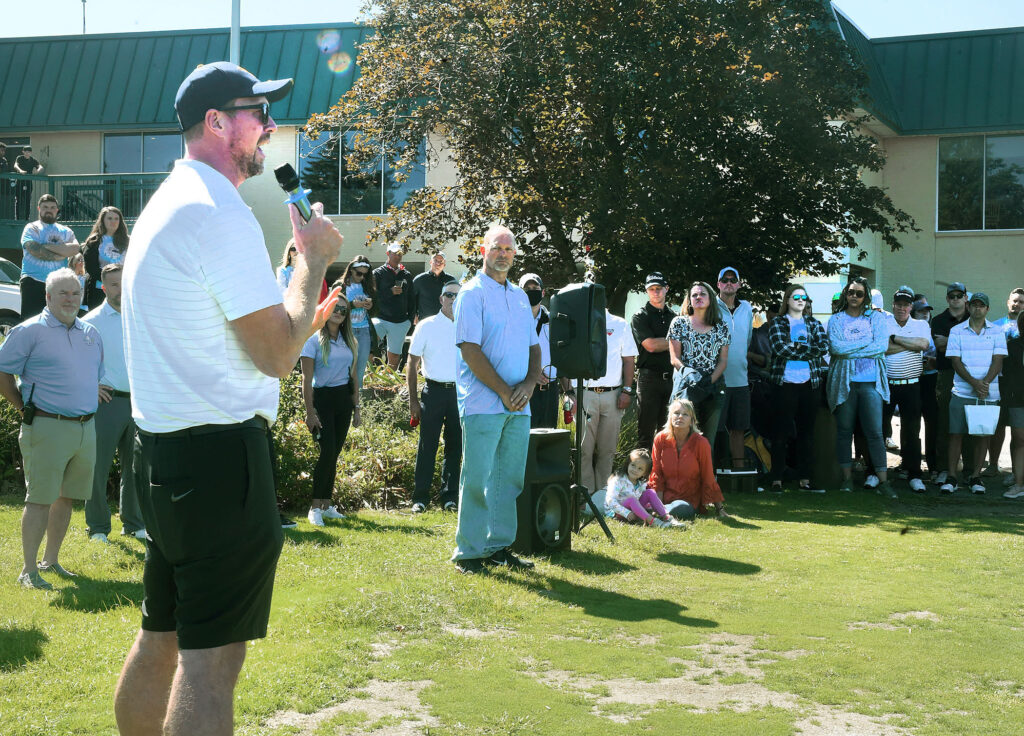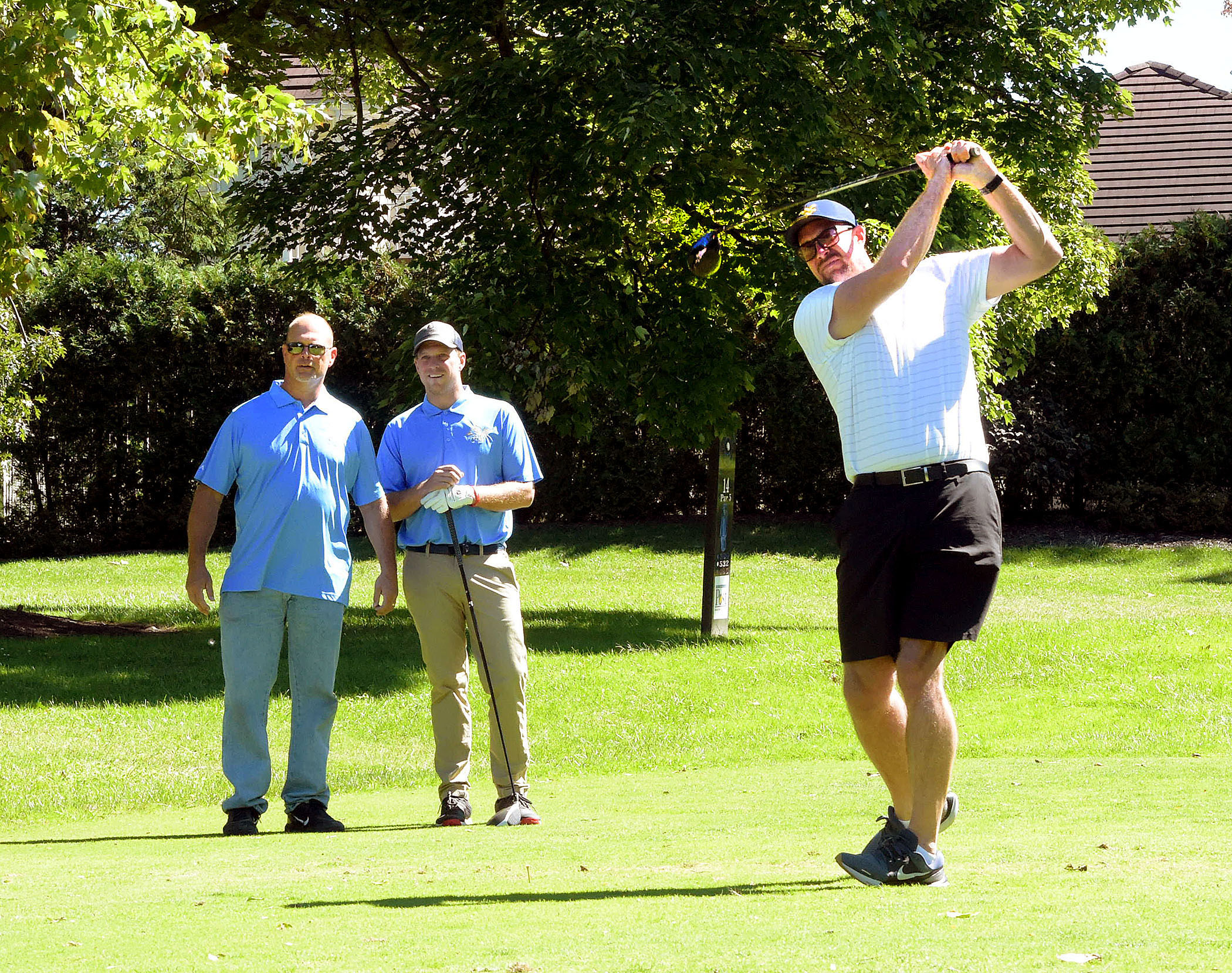Mike Cole was gentle as he adjusted the photograph.
Tender, even.
Like a dad with a newborn.
It was a smiling candid of his daughter, Lauren Cole, on the day she was awarded her diploma in social work from WVU, sized up to fit the frame, which was among many in that gallery of her on this day.
She would later go on to pursue a master’s in that field at the school in Morgantown, on top of working at Valley Mental Health. She wanted to help people in the throes of addiction.
She wanted to save them, and she had successes, as she was good at her job.
Sadly, though, while she was keeping her clients afloat, she was secretly floundering, at the same time.
Two summers ago, the opioids won. She was 26 years old.
“And here we are,” her dad said, as nudged the frame, oh-so-slightly.
Purposeful golf
It was Friday on the links at Lakeview Golf Resort and Spa: A golden day that carried both the whisper of autumn and the multilayered frequency of golf-vibe – usually in the form of a whoop or a groan.
One whoop (a surprised one), came from the guy who pulled off a 9-iron chip for birdie.
The collective groan came from the trio who watched a buddy miss a putt for par that was a dimple away from dropping.
Mike Cole, meanwhile, sunk a slight grin as he looked around.
“I think we’re getting it,” he said. “I think we’ve got a tournament.”
Which is why all those golfers were there, to gnash over the bogeys while savoring Golf Channel shots.
They were helping fulfill Lauren’s Wish, you see.
Both are capitalized, because it was official.
Lauren’s Wish is the name of the nonprofit formed by Mike Cole and others after his daughter’s overdose death.
It’s also the name of the inaugural golf tournament in her name organized by Cole and his buddies.

One big wish
Lauren’s Wish (and wish) was for the establishment of a place where people truly can knock the addictions taking their lives in painful increments.
All 100% of Friday’s proceeds will go to the formation of a rehabilitation triage center in her name.
The center will operate from Hazel House of Hope, a sobriety center setting up lodging in the former Ramada Inn, on Scott Avenue.
Its guests will be a painfully exclusive clientele: The people who are coming out of the hospital after an overdose.
The plan is to keep those clients in the controlled environment, say, for three to five days – while convincing them to embark on a longer stay at another facility.
It’s the only way, the medical professionals in the middle of this war will attest, of taking the addiction full-on – rather than the temporary, fleeting treatment of the OD that brought them to the ER.
Hooked on death
Dr. Kevin Blankenship, whose Jacob’s Ladder facility in Aurora, Preston County prescribes to such treatment, winces whenever he hears of a case where a person is saved in the emergency room, only to be immediately put back onto the street.
That’s mismanagement of a patient suffering from a disease, said Blankenship, who is also helping plan the Lauren’s Wish facility here.
While relapses are an understood part of recovery – multiple relapses, especially, the physician said – fentanyl has a grim way of making things fatal.
Fentanyl is a synthetic opioid prescribed to treat patients with chronic pain, or intense post-operative pain after surgery. Smuggling on the streets and mixing it with heroin or cocaine is a prescription for death.
“You don’t get a second chance,” he said.
Last year, at the height of the first surge of the pandemic a record 93,000 died of overdoses in the U.S., according to The Associated Press.
According to the experts who chart addiction across the U.S., anywhere from 5 to 10% of the population are chemically predisposed to addictive behavior – be it drugs, food or any number of indulgences.
Drug-users become addicted because they simply want to recreate the euphoria of their first-ever rush, which is chemically impossible.
It doesn’t take long, physicians say, to reconfigure your brain’s neuro-pathways to the point that you aren’t using to “party” – you’re using to maintain.
“Addiction is cruel and insidious,” Blankenship said.
‘I want her to say she’s proud of me’
It also has a way of steeling one for battle, Mike Cole said. He’s already thinking about the second, annual, golf tournament.
He’s already thinking about more sponsors, to add to the more than 100 that rode in columns on that banner on the pavilion with the table where Lauren’s photographs were displayed.
If you’re interested in helping in anyway, he said, he wants you to call him at 304-282-8922.
He wants you email him at Laurenswish123@gmail.com.
About that wish: One afternoon she and her dad talked. She worried about the people in stages of addiction who couldn’t afford treatment. People who didn’t have family or any other support network.
She had, as said, the first mental scribbles of the treatment facility that is now going to bear her name.
“Lauren asked me, ‘Can we do this?’” Mike Cole remembered. “I said, of course we can.”
Three weeks later she was gone.
“She was phenomenal,” he said.
“And I promised her. When we meet up again, I want her to be able to say that she’s proud of me.”
TWEET @DominionPostWV




